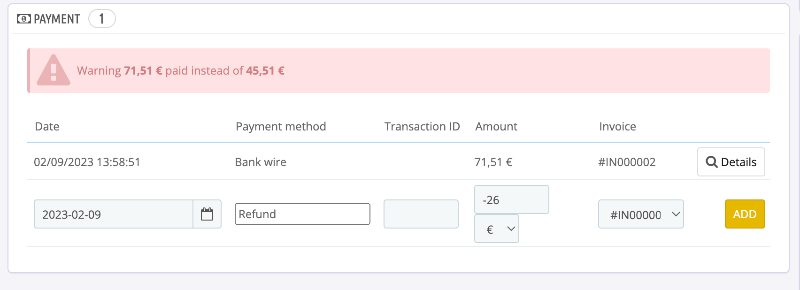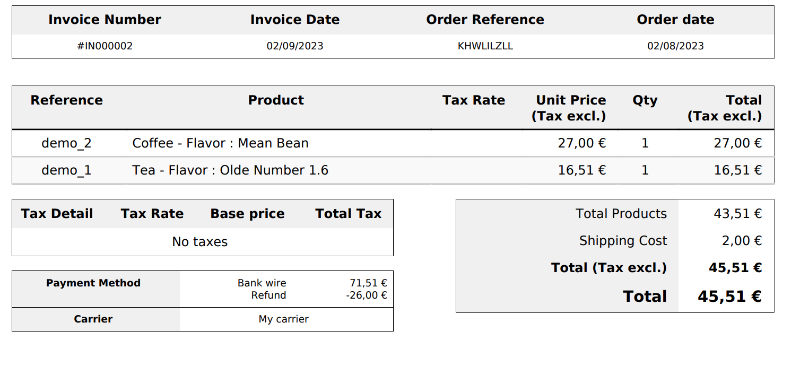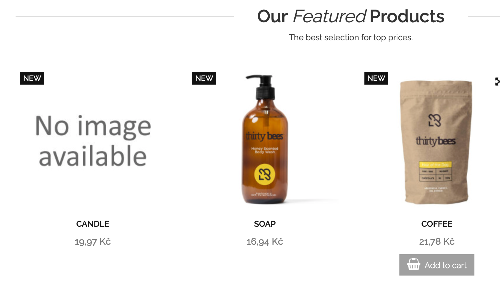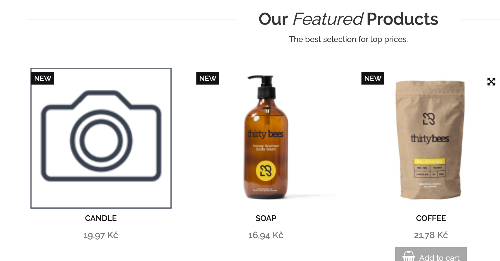-
Posts
3,134 -
Joined
-
Last visited
-
Days Won
494
Content Type
Profiles
Forums
Gallery
Downloads
Articles
Store
Blogs
Everything posted by datakick
-
Well, for 2x images, I think we should not do that. If the source file is not big enough to generate 2x image, then don't do that in the first place.
-
That functionality is indeed useful. But confirmation email is always sent, and the recipient is likely to move it to spam folder (because they didn't requested it in the first place). This will effectively degrade your send mail reputation. I believe what @selwynorren wants is some sort of bot preventions.
-
You are absolution 100% correct. If these magic constants ('medium') didn't exists in the core code, there wouldn't be this problem in the first place.
- 13 replies
-
- subcategory images
- imagesize
-
(and 1 more)
Tagged with:
-
I have crashed my site need some assistance if possible
datakick replied to The Pellet Guy's question in Technical help
You are also running quite old version of thirty bees - 1.1.0. I suggest you follow this path: first update your thirty bees to 1.3.0 (the last one that supports php5.6) then update your php version to 7.4 update your thirty bees to 1.4.0 install collectlogs module and watch for any warnings / errors and deprecations. do not update to PHP 8 until you fix all those warnings/errors It's a lot of work, I know, but it's not possible to stay at old versions of PHP forever. Your hosting provider might drop support for it in the future, you will not be able to install new modules (or new versions of your modules), there are security issues, etc. Your store is like a shark -- if you stop moving forward it will die. -
I have crashed my site need some assistance if possible
datakick replied to The Pellet Guy's question in Technical help
Delete module modules/maxmindgeoip2 using ftp -- this one is not compatible with your php version. Seriously, PHP 5.6? -
I have crashed my site need some assistance if possible
datakick replied to The Pellet Guy's question in Technical help
Enable debug mode, as encoded encryptions are not useful for us. FTP to your server, go to /config/ directory, edit file defines.inc.php, and change /* Debug only */ if (!defined('_PS_MODE_DEV_')) { define('_PS_MODE_DEV_', false); } to /* Debug only */ if (!defined('_PS_MODE_DEV_')) { define('_PS_MODE_DEV_', true); } Then you will see the actual error message. -
Unfortunately, AdminCategoriesController hardcoded these image types into the code. Nobody fixed it yet https://github.com/thirtybees/thirtybees/issues/1394
- 13 replies
-
- subcategory images
- imagesize
-
(and 1 more)
Tagged with:
-
I would also like to reiterate that this is an open source module. Everyone is allowed and encouraged to submit fixes, and/or new features. In this case, some forum user (@Cassim) actually wrote they they are working on a fix for this. I've not seen the PR yet, hopefully they will submit it soon.
-
https://github.com/thirtybees/niara/blob/15e5338e628fca184a339d6cde66c961bfeb8169/modules/homefeatured/homefeatured.tpl#L4
- 1 reply
-
- 1
-

-
Very nice, thank you. I believe the reason why this functionality was disabled was because it's not possible to have downloadable products per combination, which is something that a lot of people would expect. For example, if you sell modules, it is reasonable to expect that there could be different zip files for attribute platform (values thirtybees / prestashop 1.6 / prestashop 1.7). But even with this limit, it's definitely useful to have combinations for virtual products. With that, you can sell modules with different level of support, for example. I'll test your changes and merge them shortly
-
PDF invoice: order totals calcualted differently depending on location in invoice?
datakick replied to 30knees's question in Technical help
It make sense in B2B mode. Not so much in B2C -
PDF invoice: order totals calcualted differently depending on location in invoice?
datakick replied to 30knees's question in Technical help
Actually, when you generate invoice, and no payments are recorded yet, system will create new payment record. https://github.com/thirtybees/thirtybees/blob/8b522e19ccaadd1ba6570d5d853628bd7f471ed8/classes/order/Order.php#L1590 There is a comment in code: Since an invoice always requires an existing order payment, we are going to add one Looks like thirty bees does not support unpaid invoices??? Anyway, if you modify the order after the payment is recorded, you should record additional payment (possibly negative) All payments will be displayed on invoice, making it match -
It's a actually a bug that you don't have these images 🙂 Compare result (with and without) After installation, these images actually exists. But over the time they are lost, which is a bug https://github.com/thirtybees/thirtybees/issues/1503
-
Most select queries should work. If not, please file issue on github. Recently, we have fixed some issues in this area, so it's best if you could update to bleeding edge and test there.
- 1 reply
-
- 1
-

-
This curl command fails: curl -H"Accept-Encoding: gzip" "https://instruments.co.za/attachment?id_attachment=155" --output file.zip Which means your server has some input/output compressing issues. Check mod_deflate configuration
-
This does not look like an application issue, most likely server configuration issue. It's quite funny, actually. The attachment can be downloaded using 'curl' command without problem: curl https://instruments.co.za/attachment\?id_attachment\=155 --output file.zip However, when opened in browser, 500 error code is returned. There must be some very clever and useful and idiotic security settings enabled on your server. Ask your hosting provider.
-
I meant that modules should not use hardcoded string 'home' or 'cart' like this <img src="{$link->getImageLink($rewrite, $imageId, 'home')}"> Because 'home' image type does not have to exists. Modules should allow user to select image type they want to use in configuration page, and pass this selection to template. <img src="{$link->getImageLink($rewrite, $imageId, $selectedImageType)}"> Unfortunately, a lot of module developers don't do that (some of my own modules are using hardcoded image types as well), and that can cause troubles. And the need for this 'guessing' type detection.
-
You can edit specific prices in 1.4
-
Compatibility reasons. Image type name should always be provided without theme prefixes, for example 'home' or 'cart'. However, sometimes module developers used 'home_default' instead of 'home', where 'default' is name of ps16 default theme 🙂 Such module worked correctly on default theme only. Then some theme developer copied default theme, but kept the image type names 'home_default', which ultimately lead to formatted name like 'Niara_home_default'. So yeah, there is a lot of fixing and adjusting, otherwise most module would stop working. This test summarize this mess quite nicely: https://github.com/thirtybees/thirtybees/blob/main/tests/Unit/ImageTypeTest.php I don't think that module developers need specific sizes that often. What they want is their module to integrate seamlessly into the theme design. To do that, they should not make any assumptions about image sizes in the first place. For example, there can be a theme that displays very large product images on home page. Instead of standard 250x250, this theme renders only few products on home page with 500x500. Any module that want to display on home page some additional products should probably render it in the same size, otherwise it would look bad. If module developer used here getImageTypeBySize(250, 250) the result would not be nice. I think that image type abstraction is not a bad thing. What is wrong is hardcoding image types into templates. These should be configurable. Nowhere in the templates we should see strings constants. I agree that it would be very nice addition to have a method to choose image type by size. Sometimes it is indeed needed.
-
I've just released new version 0.9.2 that fixes the problem with delivery option saving. Everyone, please update module !!!!
-
Oh, that's a huge bug. Thanks for reporting it, I will fix it ASAP.





